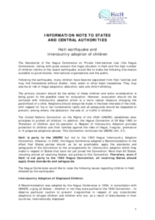The Secretariat of the Hague Conference on Private International Law (the Hague Conference), noting with great concern the tragic situation in Haiti and the high number of children victims of the recent earthquake, would like to make the following information available to governments, international organisations and the public.
Following the earthquake, many children have become separated from their families and may find themselves without shelter, food, water or other basic necessities. They may also be at risk of illegal adoptions, abduction, sale and child trafficking.
The primary concern should be the safety of these children and some consideration is being given to the possible need for evacuation. However, evacuation should not be confused with intercountry adoption which is a more radical measure changing the parenthood of a child. Adoptions should always be made in the best interests of the child, with respect for his or her fundamental rights and all safeguards should be respected to prevent, among others, the abduction, the sale of, or traffic in children.
While Haiti is not a signatory to the Hague Convention, the are signatories to the UNCRC. A Recommendation was adopted by the Hague Conference in 1994, in consultation with UNHCR, urging all States – whether or not they were parties to the 1993 Convention – to observe particular caution to prevent irregularities in respect of any cross-border adoptions of refugee children and children who are, as a result of disturbances in their countries, internationally displaced.
Where an adoption has already been completed by a court in Haiti and all safeguards have been applied, but certain administrative procedures (e.g. relating to travel documentation) remain to be completed, it may well be justifiable to expedite the transfer of the child to the State where the child is to live with the adoptive parents. It is essential that the identity of the child be verified before departure.
Any decision to evacuate a child should be based on considerations of the child’s safety and should not be confused with the adoption process.
A humanitarian disaster such as the earthquake should not be the reason for by-passing essential safeguards for safe adoption. In a situation where child care and protection services have broken down such as in Haiti, the risks are even greater that the adoption may be “unsafe”. This is why in these tragic situations the emphasis should first be on child protection, rather than adoption.
In the spirit of this Recommendation, it is clear that in a disaster situation, like that brought about by the earthquake, efforts to reunite a displaced child with his or her parents or family members must take priority. Premature and unregulated attempts to organise the adoption of such a child abroad should be avoided.

